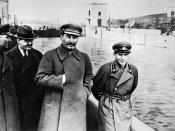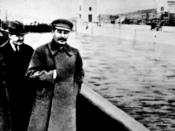Introduction
It is said that censorship never dies, it changes its form. Debates about politically acceptable ideas and books continue in current debates about extremism on the Internet. Issues of human rights preoccupy us today, just as they have in prior centuries. We are interested in what ideas and media circulate in society, concerned about what impact they are having on our children, wondering how to balance law and order on the one hand and freedom of action and speech on the other.
There are many examples, today and in the past, of where societies, and particularly institutionalised power, have set out to control the creation and dissemination of ideas. The index of prohibited books, back in 1564, defined what books and authors could be read by Catholics. Nazi Germany, Stalin's Russia, apartheid South Africa, and many states today, set up systematic control of ideas as part of a wider ideological and social control.
Look at the political, ideological, religious, moral, artistic, and educational context in any study of censorship.
Censorship changes: many people believe that we are getting more enlightened and tolerant as time goes by, allowing more pluralistic access to information and media, being more accepting of ethical diversity. Others believe that dangers face society from too much access to all forms of information and ideas, above all by children, and above all because of the Internet, and so advocate greater restraint and control.
These "conservatives" and "liberals" look to many formally and informally established groups in society to support their cause: the government, the legislators, the police, the teachers, the church, the family, and others. You may wish to consider whether there really are two groups, conservatives and liberals, on matters of censorship.
Too much control can be tyranny, while too much tolerance can...



Freedom of speech
Very informative and shows that you put effort into your work.
5 out of 5 people found this comment useful.